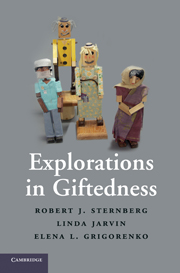Book contents
- Frontmatter
- Contents
- Preface
- 1 What Is Giftedness?
- 2 Theories of Giftedness
- 3 WICS as a Model of Giftedness
- 4 Intelligence and Giftedness
- 5 Creativity and Giftedness
- 6 Wisdom and Giftedness
- 7 Giftedness as Developing Expertise
- 8 Giftedness and Culture
- 9 Learning Disabilities, Giftedness, and Gifted/LD
- 10 Identifying the Gifted
- 11 Educating the Gifted
- References
- Index
Preface
Published online by Cambridge University Press: 05 June 2012
- Frontmatter
- Contents
- Preface
- 1 What Is Giftedness?
- 2 Theories of Giftedness
- 3 WICS as a Model of Giftedness
- 4 Intelligence and Giftedness
- 5 Creativity and Giftedness
- 6 Wisdom and Giftedness
- 7 Giftedness as Developing Expertise
- 8 Giftedness and Culture
- 9 Learning Disabilities, Giftedness, and Gifted/LD
- 10 Identifying the Gifted
- 11 Educating the Gifted
- References
- Index
Summary
William James and William James Sidis represent almost opposite ends of a continuum. William James was a gifted youngster who was to become one of the leading philosophers and psychologists of his generation. Some consider him to be the greatest American psychologist of all time. William James Sidis was a gifted youngster who flamed out early in life and, after an extraordinary start, became bitter, let his health go, and died at an early age. James is remembered as a gifted adult who started off as a gifted youngster. Sidis never reached the glory of his namesake and is remembered as a classic example of a bright flame that was extinguished early.
What is it that leads some gifted youngsters to become gifted adults and others not to make the transition from being a gifted youngster to being a gifted adult? What leads individuals to make transitions in the kinds of developing expertise that lead society to label these individuals as gifted, not only from childhood to adulthood but from one stage of childhood to another stage of childhood or from one stage of adulthood to another stage of adulthood? More specifically, what leads individuals from some ethnic groups to be identified as gifted more frequently than individuals from other ethnic groups?
- Type
- Chapter
- Information
- Explorations in Giftedness , pp. xiii - xviPublisher: Cambridge University PressPrint publication year: 2010



